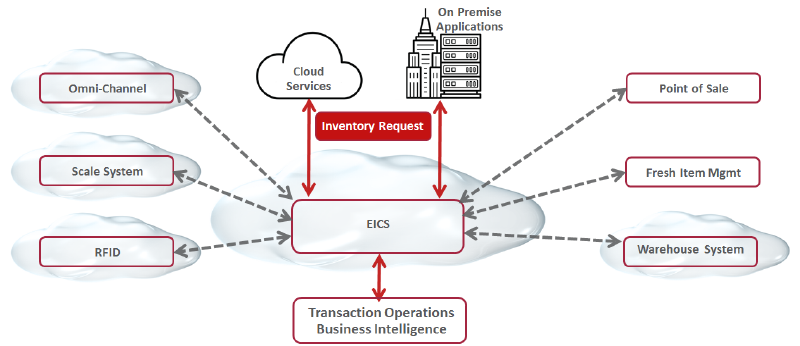1 Overview
Business Overview
EICS is a cloud service platform helping a retailer track discrete store and warehouse inventory across the enterprise. In return this information can be provided to downstream systems for Omni-Channel purposes or even general merchandising.
The platform comes with a PC-based administration layer developed in Oracle JET.
This administration layer allows:
-
System and store business process configuration
-
Setup of core data elements like reason codes, context values and tolerances for picking
-
Configuration of printers
-
Prioritizing the barcode parser
-
Scheduling the batches and managing polling timers for the integration layer
-
Management and scheduling of Product Groups to automate processes like stock counts
-
Notification setup
-
Extended Attributes setup and assignment to hierarchies
-
Setup of server based translation values
-
Printing reports
-
Creation of roles and role user assignments
EICS leverages a host of APIs to allow a retailer to import and export data. The application it leverages is the Retail Integration Cloud Service (RICS).
In addition to these integration tools, several batch processes also exist for operational bulk data processing.
Figure 1-1 EICS Platform

EICS does not have an operational transaction execution layer, and counts on the optional mobile UI of the Store Operations Cloud Services (SOCS) to execute store inventory transactions.
SOCS is a cloud service mobile UI which requires Enterprise Inventory Cloud Service (EICS) as a pre-requisite. It executes operational inventory transactions related to a store. The application itself is a fat client developed on Oracle's Mobile Application Platform (MAF).
The UI can be deployed on iOS, Android and Windows 10 mobile.
SOCS supports the following functions:
-
Scanning of barcodes (GS1, VPN, item, container ID..) to identify a SKU or container
-
Container, item and supplier lookup
-
Inventory adjustment with appropriate reason codes
-
Adhoc, unit, problem line and unit and amount Stock counts
-
Creating, accepting, picking and rejecting transfer requests
-
Shipping to another warehouse, store or external finisher
-
Receiving from warehouse, store or external finisher
-
Accepting Return to Vendor (RTV) request, creating RTVs and shipping to a vendor
-
Direct Store Deliveries with Purchase order (PO), without PO and against an ASN
-
In Store Replenishment from backroom to shop floor
-
Management of inventory on shop floor and backroom
-
Customer order Pick, pack and ship
Multiple Products
EICS (Enterprise Inventory Cloud Service) and SOCS (Store Operations Cloud Service) are two separately licensed products.
-
EICS Browser Client
-
EICS Web Services
-
EICS Server Tier
-
EICS Database tier with data access code, batches, reports
SOCS includes:
-
Oracle MAF Client
In order to use SOCS, EICS needs to be deployed.
Cloud Deployment
EICS Client
Oracle Jet based browser application that allows the user to perform a wide range of administrative functions.
SOCS Mobile Client
The mobile client provides all the day-to-day transactional workflows within an Oracle Mobile Application Framework (MAF) platform. MAF is a hybrid-mobile platform that supports both iOS and Android devices. For more details, please see MAF Guide.
Web Services
There is no GUI for the SOAP web services APIs that are provided by EICS. These APIs allow customers to create or develop applications or add-ons that can replicate some or all of the steps of a transaction workflow.
WTSS / IDCS or OCI IAM
WTSS: Web Traffic Security Service
Integration Cloud Services uses Oracle Identity Cloud Service (IDCS) as its identity provider (IDP) or Oracle Cloud Infrastructure Identity and Access Management (OCI IAM) as its identify provider (IDP).
EICS Application Server(s)
Server deployed as a J2EE application inside the WebLogic Application Server.